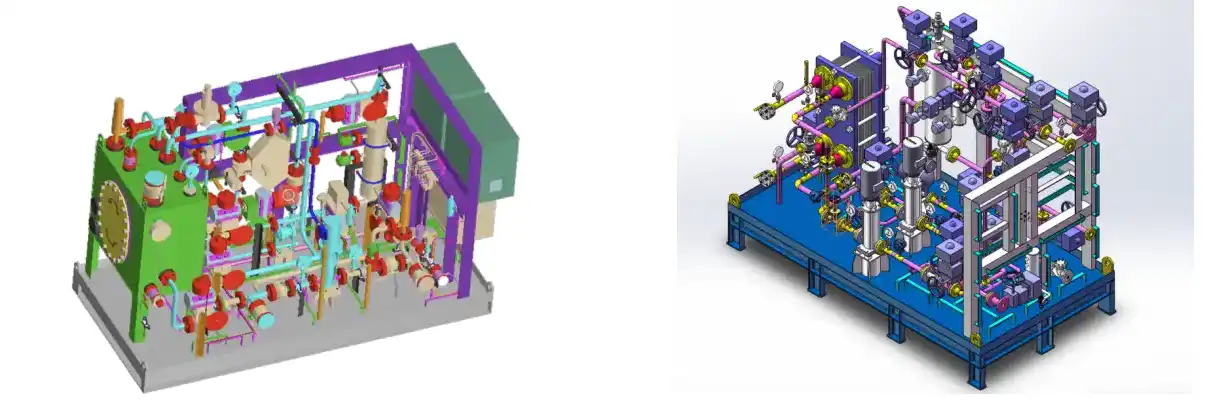Understanding Methanol's Low Flashpoint Properties
Methanol, a popular alternative fuel source in various industries, is known for its low flashpoint characteristics. Understanding these properties is critical for safe handling and effective utilization, particularly in fuel supply systems.
Low Flashpoint and Its Implications
Methanol has a flashpoint of around 12°C, significantly lower than many conventional fuels. This means it can ignite at relatively low temperatures, posing increased risks in environments where proper safety measures are not followed. The low flashpoint necessitates careful storage and handling procedures to avoid accidental ignition. For example, methanol must be stored in specially designed containers that can prevent exposure to heat sources and reduce the risk of vapor release. In fuel supply systems, such as in engines or boilers, it is crucial to have precise temperature controls and fail-safe mechanisms in place to maintain a safe operating environment.
Handling Methanol in Fuel Supply Systems
Due to its low flashpoint, methanol fuel systems require robust safety protocols during transport, storage, and usage. These systems often include fire suppression mechanisms, ventilation controls, and sensors to monitor temperature and pressure levels. When used as a fuel, methanol needs to be handled with extra care to prevent leaks and vapor formation, which could potentially lead to hazardous situations. Operators must ensure all components of the fuel supply system are compatible with methanol's chemical properties, particularly its potential to corrode materials like aluminum and copper. By incorporating safety standards that address these concerns, industries can benefit from methanol's efficiency and lower environmental impact while minimizing risks associated with its flammability.
TSC, the brand name of CM Energy, has invested heavily in research and development to create Methanol Feed Systems that incorporate state-of-the-art vapor management technologies. These systems ensure that methanol vapors are continuously monitored and controlled, significantly reducing the risk of ignition.
Innovative Safety Measures in Modern MFSS
To address the inherent risks associated with methanol's low flashpoint, modern MFSS incorporate a range of innovative safety features. These advancements are crucial in ensuring the safe and efficient operation of methanol-powered vessels.
Double-Walled Piping and Leak Detection
One of the primary safety measures in Methanol Fuel Supply Systems is the use of double-walled piping systems. This design provides an additional layer of protection against leaks and helps contain any potential spills. Sophisticated leak detection systems are integrated into the space between the inner and outer pipes, allowing for immediate identification and response to any breaches in the system.
CM Energy's MFSS utilizes advanced sensor technology to monitor the integrity of the double-walled piping continuously. This proactive approach enables early detection of potential issues, preventing small problems from escalating into major safety hazards.
Inert Gas Systems and Purging Procedures
To further mitigate the risks associated with methanol's low flashpoint, modern MFSS incorporate inert gas systems. These systems displace oxygen in storage tanks and piping, creating an environment that inhibits combustion. Rigorous purging procedures are implemented during maintenance and refueling operations to ensure that all potentially explosive vapor mixtures are safely removed from the system.
TSC's MFSS design includes automated purging sequences that minimize human error and ensure consistent safety standards across all operations. This automation not only enhances safety but also improves operational efficiency.
Training Crew for Methanol Fuel Handling: Best Practices
The safe operation of MFSS relies heavily on the competence and awareness of the crew. Comprehensive training programs are essential to equip personnel with the knowledge and skills necessary to handle methanol fuel safely.
Specialized Safety Protocols and Emergency Response
Crew members operating methanol-powered vessels must be thoroughly trained in specialized safety protocols specific to low flashpoint fuels. This training includes proper handling procedures, personal protective equipment usage, and emergency response tactics tailored to methanol-related incidents.
CM Energy offers extensive training programs that cover all aspects of Methanol Fuel Supply Systems operation and maintenance. These programs emphasize hands-on experience with simulated emergency scenarios, ensuring that crew members are well-prepared to handle any situation that may arise.
Continuous Education and Safety Culture
The rapidly evolving nature of methanol fuel technology necessitates a commitment to continuous education and safety culture development. Regular refresher courses, safety drills, and updates on the latest industry standards are crucial components of maintaining a high level of safety awareness among crew members.
TSC's approach to crew training extends beyond initial certification, offering ongoing support and educational resources to ensure that personnel remain at the forefront of MFSS safety practices. This commitment to continuous improvement helps foster a strong safety culture onboard methanol-powered vessels.
In conclusion, a multidimensional strategy combining creative engineering solutions with thorough crew training is needed to manage the low flashpoint dangers related to Methanol Fuel Supply Systems. It is impossible to overestimate the significance of strong safety protocols as the marine sector continues to use methanol as a greener fuel substitute.
CM Energy is still committed to developing MFSS technology while putting safety first at all levels. We are laying the foundation for a safer and more sustainable future in maritime transportation by utilizing state-of-the-art design elements, strict safety regulations, and extensive training initiatives.
For more information on our state-of-the-art Methanol Fuel Supply Systems and comprehensive safety solutions, please contact us at info.cn@cm-energy.com. Let TSC be your partner in navigating the transition to cleaner, safer marine energy solutions.

